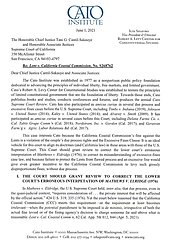Learn more about Cato’s Amicus Briefs Program.
Five years ago, the California Coastal Commission fined Warren and Henny Lent (now represented by the Pacific Legal Foundation) more than four million dollars for their ostensible refusal to remove a fence and stairwell blocking a public pathway to the beach. The commission justified the fine on the grounds that the Lents’ apparent years-long resistance was malfeasant, warranting a fine far greater than staff had recommended.
Under the state’s Coastal Act, the commission has the power to impose a fine of up to $11,250 for each day an owner fails to correct a violation, up to a per-violation maximum of twenty million dollars. The commission’s follow-through here is an egregious abuse of power—though not at all surprising. The commission has a long history of imposing sentences that do not fit beachfront owners’ “crimes.” Indeed, one of the Supreme Court’s most notable takings rulings—Nollan v. California Coastal Commission (1987)—stymied the commission’s efforts to force a couple, not unlike the Lents, to grant public access in exchange for approving a rebuild of their home.
The Lents have challenged the fine as unconstitutional, and their case is now at the California Supreme Court. Cato, which is no stranger to the commission’s shenanigans, has filed an amicus letter in support of the Lents urging the court it to take the case and rule that the commission violated the Lents’ Eighth and Fourteenth Amendment rights against excessive fines and to due process, respectively.
In a 1976 case called Mathews v. Eldridge, the Court held that due process is owed when the government deprives individuals of certain interests, and how much process is due is related to “the degree of potential deprivation that may be created.” Misreading this holding, the commission argued, and the California appeals court agreed, that because the commission could have fined them far less, due process wasn’t owed for the hefty fine. In truth, though, the Lents had no real sense of the financial stakes until the commission made their decision and it was too late to appeal.
The Supreme Court has also prohibited punitive fines that were “grossly disproportional” to the gravity of the “offense.” Despite the commission’s insistence that the fine is remedial—that all it does is charge the Lents for the damages the couple’s failure to remove imposed on their fellow Californians—at the hearing it seemed as if the commission was out to punish the Lents.
The Lents have suffered perhaps the worst of the California Coastal Commission’s abuse, but their case is no outlier. Like the Nollans, the Lents are victims of a state agency that has the want, and now the permission, to use their fining power to line its own pockets and chill beachfront owners into submission, of whom thousands are likely in violation of one or more persnickety Coastal Act rules. The commission has given no indication that it will stop at the Lents. It is up to California’s highest bench to align its Eighth and Fourteenth Amendment doctrine (and California law) with the Supreme Court’s longstanding precedents.

This work is licensed under a Creative Commons Attribution-NonCommercial-ShareAlike 4.0 International License.


